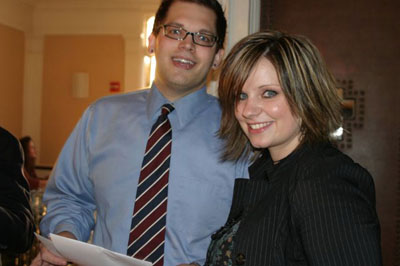
(RNS3-OCT24) Matt Riley and Christy Groves are co-leaders of “The Left Behind,” an atheist
student club at Yale Divinity School. For use with RNS-10-MINUTES, transmitted Oct. 24, 2007.
Religion News Service photo courtesy Matt Riley.
(RNS) As politicians and voters try to measure the impact of the new health care reform bill, filmmaker Martin Doblmeier releases “The Adventists,” a documentary about a Christian denomination that’s often praised for its health care model.
The Seventh-day Adventist lifestyle includes exercise, vegetarianism and rest. As a result, national studies have shown that Adventists live eight to 10 years longer than others.
Doblmeier’s film explores this intersection between faith and modern medicine, including famous Adventists like Dr. Leonard Bailey, the man behind the 1984 “Baby Fae” baboon-to-baby heart transplant. It airs on PBS stations during the week of April 5, National Public Health Week.
Doblmeier talked about Adventist contradictions, hospital models and his decision to leave doctrine out of the film. Some answers have been edited for length and clarity.
Q. Why did you decide to make this film?
A. It was an opportunity to tell a story about a really interesting group that people didn’t know much about. Also, there was timeliness in focusing on health when the nation is embroiled in a debate about health care.
Q. Do you see the Adventist approach as the future of health care?
A. They start with the principle that health care is sacred work, that the body is the temple of God. The longevity-of-life studies are pretty clear and consistent that Adventists are living longer. I also love the idea of saying we’re not only going to take care of you when you come down with chronic illness, but the hospital is also a place to keep you healthy (offering meals and exercise programs). I don’t want in any way to say there aren’t wonderful health care facilities that are being operated by everybody else. But the Adventists are doing something really unique.
Q. How does the Adventist lifestyle fit into the national campaign to curb obesity?
A. The Adventists aren’t the only ones saying watch your diet and exercise — we’re all saying that. But it’s one more affirmation about how it can actually work in your life. To see that Adventists are living eight to 10 years longer shows that what they’re doing can be successful.
Q. One of the Adventists’ founding principles was that Jesus was coming back soon. So why work on the body if Jesus might come back tomorrow?
A. There are many ironies within the Adventist thinking. One irony is that they seem to be a conservative group, yet they’re knee-deep in medical technology that’s way out on the forefront. The other irony is they believe in the near coming of Christ, the end of the world, but they’re not taking that lying down. They’re using the time they’ve been given in productive ways.
Q. If Adventists are conservative, why do they seem to have a liberal stance on health care?
A. I use the word conservative; maybe “traditional” is the more appropriate word for describing Adventists. I think they, like all faith traditions, are convinced that the mandate they have is for the care of everyone. I’m not sure whether that falls into the liberal or conservative camp.
Q. Why did you focus more on health care than doctrine?
A. I felt as though the documentary would best serve the country right now if it spoke about some of their history, some of their beliefs, but kept health and wellness as the central focus. We do touch on some theology, but not all of it.
We do touch on the aspect of the Sabbath rest. Most people, if they’re Christians, go to church on Sunday and for the rest of the day they’re out at the shopping mall or fixing the fence in the backyard. By Monday morning they’re totally exhausted. The Adventists say Saturday, the (original) Sabbath, was given as truly a day of rest.
Q. Is there one moment in the film that stands out to you?
A. The Lynn Bailey infant heart transplant story — both as a historic reality that brought Adventists to world awareness (in 1984) when he performed the Baby Fae operation which a lot of people didn’t like at the time. Now, 25 years later, he’s still performing these infant heart transplants and saving lives.
Q. What idea do you hope viewers will take away?
A. The idea of framing health care as sacred work brings everything religion is supposed to stand for right into the key of the health care debate.




